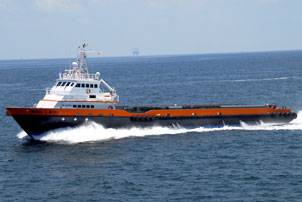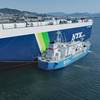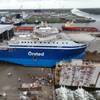Offshore Update: Waiting on Feds to Issue Permits
By Susan Buchanan, from the November 2010 edition of MarineNews
Marine companies along the Gulf of Mexico have seen little new business since the offshore drilling moratorium was lifted in early October as oil producers apply for permits and decide how to navigate costly safety regulations.
At Bollinger Shipyards, Inc., one of the top U.S. boat builders, Chief Executive Officer Boysie Bollinger, said “we're waiting for BOEM to start issuing offshore drilling permits, and no one has any idea when that will be.” He wonders if the government knows when more permits will be released. BOEM, or Bureau of Ocean Energy, Management, Regulation and Enforcement, is part of the U.S. Dept. of Interior and oversees offshore drilling.
At the company's Lockport, La. headquarters, Bollinger said “this year is almost finished and I'm nervous about the first quarter of 2011. We've had some reductions in force and loss of work at our company since the moratorium was imposed.” With twelve shipyards in South Louisiana and Texas, Bollinger builds offshore-oil support vessels, lift boats, barges, drilling rigs, oil skimmers and military patrol boats.
For now, much of the Gulf's drilling remains on pause. In Morgan City, La., David Barousse, business development director at Fleet Operators, Inc., said “nothing has changed for us since the moratorium was lifted. We have boats standing by, waiting for drilling operations to resume.” One of the firm's vessels is providing emergency services for workers on a rig that is not drilling now. Fleet Operators owns and charters supply vessels for the offshore oil and gas industry.
“Our customers are saying that it's been difficult to get permits from the BOEM to do pretty much anything offshore,” Barousse said. Moreover, a de facto moratorium on shallow water drilling has hurt both the oil and marine industries, he noted. All of Fleet Operators' vessels are currently working, however, mainly on construction and production jobs.
The offshore drilling ban shut down 33 rigs from May into October, and few permits were issued for shallow water drilling over that period. By late September, BOEM had issued only six permits for new shallow water wells in the five months since BP's April 20 rig explosion, according to a recent report by Bernard Weinstein at Southern Methodist University's Maguire Energy Institute. In comparison, an average 10 to 15 permits were issued monthly for new, shallow water wells before the spill, he said.
Under the new regime, more than 30 offshore rigs in the Gulf must apply for new drilling permits and undergo inspections before getting the federal go-ahead to operate. At least some permits will be approved by year end, according to BOEM director Michael Bromwich.
Moratorium & New Regulations Disrupt Business Plans
At Gulf Craft, LLC, Chief Financial Officer Scotty Tibbs said the offshore moratorium interrupted business activities and dashed planning efforts at companies along the Gulf. Business won't start to recover until next year at the earliest, he predicted. His firm builds aluminum crew and supply vessels in Patterson, La.
“Congress and the Administration can issue edicts and don't have to make plans,” Tibbs said. “In boat building, as in the oil and gas industry, we have to plan, design, engineer and construct projects many months and years ahead.” Federal regulations can change at any time, without regard to the realities of the industries involved, he said.
Tibbs continued, saying “the moratorium has ended, but the oil and gas industry has been sent a set of new regulations that are very confusing and very costly. Washington is regulating this country out of business and making us become more and more dependent on foreign sources.” He added “this is bad policy!”
After the moratorium jolted companies along the Gulf in May, the Interior Dept. rocked the boat again by issuing new rig and drilling safety regulations in late September, industry members said. New standards were set for well design, cementing, blowout preventers and responding to spills. By the agency's own estimates, the latest rules will increase deep water well-drilling costs by anywhere from $170,000 to $1.4 million per well, and will raise shallow water drilling costs an average $90,000 per well.
New, higher costs for safety are offset by the benefits of avoiding another major spill that could cost billions of dollars, according to the U.S. Dept. of the Interior.
Smaller exploration companies that don't have deep pockets will feel the sting from new regulations. Joel Broussard, president of Gulf Offshore Logistics, Inc. in Mathews, La., said “the Obama Administration has succeeded in making big oil bigger with its knee jerk reaction” of imposing the moratorium and then issuing costly rules. His company provides vessels and logistics to the oil and gas industry.
Rigs & Workers Head Overseas
The current administration's policies will make the U.S. more dependent on foreign oil and will send more jobs overseas to Brazil and Africa, Broussard said.
Some of the rigs idled by the moratorium lost nearly $1 million a day, and couldn't afford to remain in the Gulf. Five rigs moved to Egypt, Nigeria and the Congo, and won't be back anytime soon, marine industry members predicted. Workers were laid off or transferred, and others found new jobs overseas on their own.
An inter-agency report from the Obama Administration in late September estimated that 2,000 jobs were lost on Gulf of Mexico rigs during the drilling moratorium.
John George, co-owner of Custom Boat Manufacturing Inc. in St. Bernard, La., said “we haven't been affected by the moratorium, but we hear by word of mouth that companies and individuals along the coast have been.” Custom Boat Manufacturing builds aluminum flat boats for shallow water, and a few of them are used for oil-related activities.
“My doctor in Houma said some of his patients who were employed offshore were leaving to work overseas,” George said. A number of oil and gas companies have offices in Houma, located on Louisiana's southeast coast. For rig workers heading abroad, wages are often higher than in the Gulf, but political and other dangers exist.
It Pays to Diversify
Allen Moore of Semco LLC in Lafitte, La. on the Intracoastal Canal, said “we didn't pick up any new business during the offshore moratorium, but we stayed busy because we also work with customers in the onshore drilling industry.” He added “of course, slow economic conditions have affected everyone.” Semco LLC is a shipyard, building vessels and equipment for the offshore oil, natural gas and renewable energy industry. The company produces lift boats and drill barges.
Tibbs at Gulf Craft said “the U.S. has become over regulated and the lawyers are in charge. Thankfully, we're building vessels that our customers can operate in international waters to offset lost business in the U.S. Gulf.” He added “it's sad to say that American companies have become dependent on other countries to support us.”
On a brighter note, Gulf Coast firms that can supply specialty equipment and vessels needed by oil companies to meet new safety rules may benefit from changes in federal regulations, industry members said.











